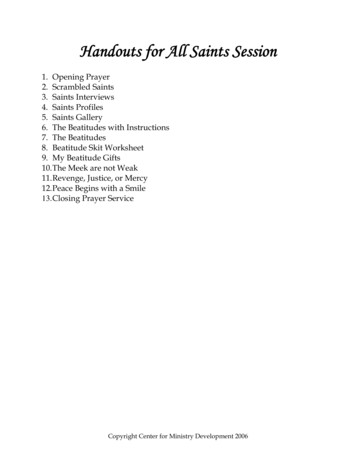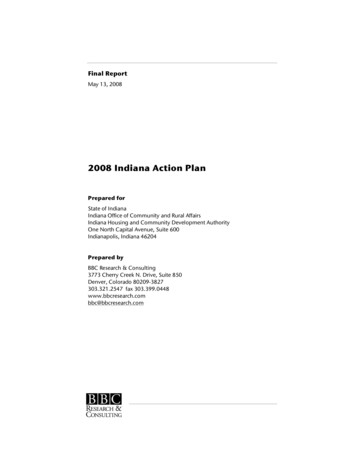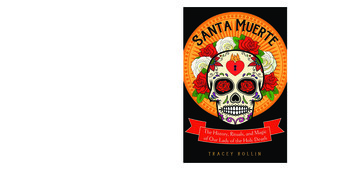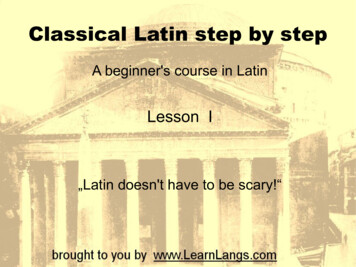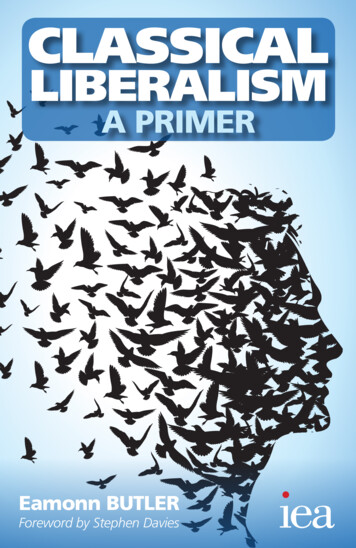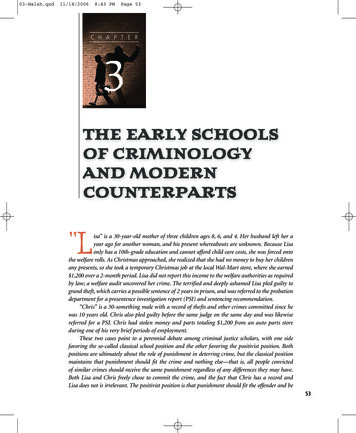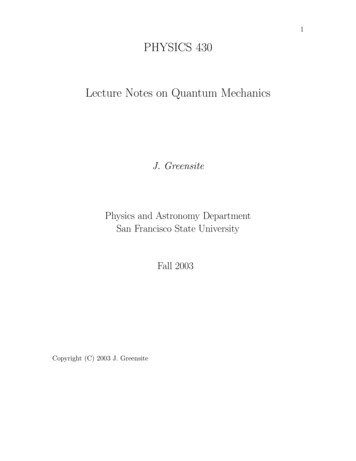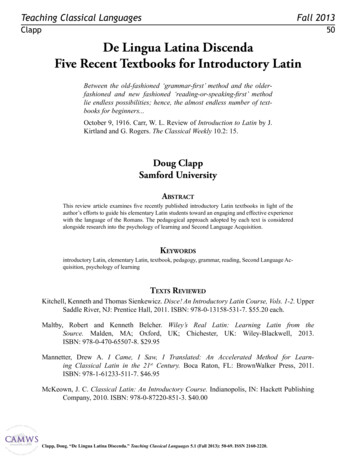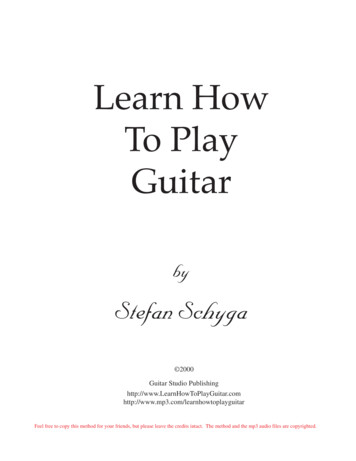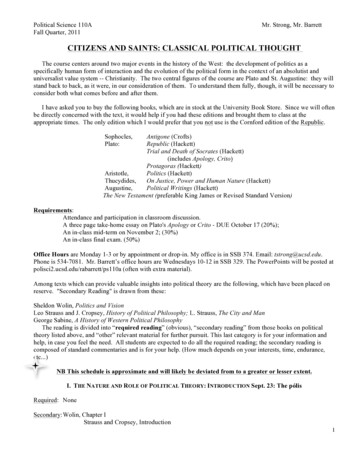
Transcription
Political Science 110AFall Quarter, 2011Mr. Strong, Mr. BarrettCITIZENS AND SAINTS: CLASSICAL POLITICAL THOUGHTThe course centers around two major events in the history of the West: the development of politics as aspecifically human form of interaction and the evolution of the political form in the context of an absolutist anduniversalist value system -- Christianity. The two central figures of the course are Plato and St. Augustine: they willstand back to back, as it were, in our consideration of them. To understand them fully, though, it will be necessary toconsider both what comes before and after them.I have asked you to buy the following books, which are in stock at the University Book Store. Since we will oftenbe directly concerned with the text, it would help if you had these editions and brought them to class at theappropriate times. The only edition which I would prefer that you not use is the Cornford edition of the Republic.Sophocles,Plato:Antigone (Crofts)Republic (Hackett)Trial and Death of Socrates (Hackett)(includes Apology, Crito)Protagoras (Hackett)Aristotle,Politics (Hackett)Thucydides,On Justice, Power and Human Nature (Hackett)Augustine,Political Writings (Hackett)The New Testament (preferable King James or Revised Standard Version)Requirements:Attendance and participation in classroom discussion.A three page take-home essay on Plato's Apology or Crito - DUE October 17 (20%);An in-class mid-term on November 2; (30%)An in-class final exam. (50%)Office Hours are Monday 1-3 or by appointment or drop-in. My office is in SSB 374. Email: tstrong@ucsd.edu.Phone is 534-7081. Mr. Barrett’s office hours are Wednesdays 10-12 in SSB 329. The PowerPoints will be posted atpolisci2.ucsd.edu/rabarrett/ps110a (often with extra material).Among texts which can provide valuable insights into political theory are the following, which have been placed onreserve. "Secondary Reading" is drawn from these:Sheldon Wolin, Politics and VisionLeo Strauss and J. Cropsey, History of Political Philosophy; L. Strauss, The City and ManGeorge Sabine, A History of Western Political PhilosophyThe reading is divided into “required reading” (obvious), “secondary reading” from those books on politicaltheory listed above, and “other” relevant material for further pursuit. This last category is for your information andhelp, in case you feel the need. All students are expected to do all the required reading; the secondary reading iscomposed of standard commentaries and is for your help. (How much depends on your interests, time, endurance,etc.)NB This schedule is approximate and will likely be deviated from to a greater or lesser extent.I. THE NATURE AND ROLE OF POLITICAL THEORY: INTRODUCTION Sept. 23: The pólisRequired: NoneSecondary: Wolin, Chapter IStrauss and Cropsey, Introduction1
Other:L. Strauss, What is Political PhilosophyP. Laslett and W. Runciman, eds. Politics,Philosophy and Society, 1st & 2nd seriesM. Oakeshott, Rationalism in Politics, esp. "Political Education"Sheldon Wolin, "Political Theory and Paradigms," in King and Parekh, eds.,Politics and ExperienceG. Kateb, Political TheoryH. Arendt, The Human ConditionII. THE DEVELOPMENT OF THE CITY AND DISCOURSE: Sept 26, 28Required: Thucydides, On Power, Justice and Human Nature (The Peloponnesian War): "Pericles' FuneralOration," "The Plague," "The Policy of Pericles," (pp.39-58), "Civil War in Corcyra," (pp.89-96); "TheMytilenian Debate" (pp 66-75); "The Melian Dialogue" (pp.102-110); The Sicilian Expedition (pp 111-154).Secondary: Strauss, pp 203-222Other: F. de Coulanges, The Ancient CityV. Ehrenberg, The Greek StateA. Gouldner, Enter PlatoL. Strauss, and Xenophon On TyrannyM.I. Finley, The Greek View of HistoryW. Jaeger, Paideia, Vol. IE. Voegelin, The World of the PolisG.R. Morrow, Plato's Cretan City, Chapters II,IIIDavid Grene, Man in his PrideAristotle, The Constitution of AthensF.M. Cornford, Thucydides MythhistoricusB. Snell, The Discovery of the MindE. Rohde, Psyche, esp. Vol. IIV. Scully,The Earth, the Temple and the Gods, Chap. I and XV. Ehrenberg, From Solon to SocratesP. Euben, "Creatures of a Day", in T. Ball, ed.,Political Theory & PraxisThe Tragedy of Political TheoryIII. THE DEMONSTRATION OF POLITICS: GREEK DRAMATISTS (Sept. 30)Required: Sophocles, AntigoneSecondary: Sophocles, Oedipus the KingOedipus at ColonnusOther:Euripides,IonHippolytusIphigenia in TaurisThe BacchaeAeschylus, The Orestes PlaysSeven Against ThebesH.F. Kitto, Form and Meaning in DramaW. Arrowsmith,"A Greek Theater of Ideas, Arion, Autumn 1963C.J. Herington, "Aeschylus: The Last Phase,"Arion, Autumn 1965T. Gould, "The Innocence of Oedipus: The Philosophers on Oedipus the King," Arion, Aut.1965, Winter, 1965.Aristotle, The PoeticsJ.P. Vernant, Myth and tragedy in ancient Greece, , esp."Oedipus without Complexes"M. Nussbaum, The Fragility of GoodnessJ. Peter Euben, ed. Greek Tragedy and Political TheoryIV. PLATO: Oct. 3--- Oct. 12
A. Introduction: The Platonic MethodRequired: None (Oct. 3)Secondary:Wolin, Chapter IISabine, Chapter III, IVStrauss and Cropsey, pp. 7-63Other:A.W. Gouldner, Enter PlatoG. Vlastos, ed.,Plato, I and II - These 3 books represent the best in analytical Plato scholarship., SocratesP. Shorey, What Plato SaidA. Koyre, Discovering PlatoA.E.Taylor,Plato, the Man and His ThoughtK. Popper,The Open Society and its EnemiesR. Bambrough, "Socratic Paradox," Philosophical Quarterly, 1960, pp.289-300J. Eckstein, The Platonic MethodV. Goldschmidt, Les Dialogues de Platon, structure et methode dialectiqueT. Gould, Platonic LoveP. Merlan, "Form and Content in Plato's Philosophy," Journal of the History of Ideas, 1947, pp. 406-430.M.J. O'Brien,The Socratic Paradoxes and the Greek MindDorothy Tarrant, "Plato as Dramatist," Journal of Hellenic Studies, 1955, pp. 82-89E. Voegelin, PlatoB. Teaching, Virtue and Knowledge: The "Protagoras"Required: Protagoras. Oct. 5,7Other:D. Gallop, "The Socratic Paradox in the Protagoras," Phronesis, 1964, pp 117-129E.R. Dodds, ed.,Gorgias, esp. AppendixF. Nietzsche,Truth and Lie in the Extra-Moral SenseO. Grube, "The Structural Unity of the Protagoras," Classical Quarterly, 1933, 203-7C. The Individual and the State: SocratesRequired: Apology, Crito. Oct 10-12Other:G. Vlastos, ed., Socrates - see also bibliography.L. Strauss, ed., Xenophon's Socratic DiscourseN. Greenberg, "Socrates Choice in The Crito," Harvard St. inC1.Philology, 1965, pp.P. Euben, "Philosophy and Politics in Plato's Crito," Pol. Theory, May 1978, pp. 149-172.D. The Response of the City (Oct 14)Required: noneSecondary: Aristophanes, The CloudsPlato, Symposium, EuthyphroOther:Xenophon, MemorabiliaL. Strauss, Socrates and AristophanesT. Strong, Friedrich Nietzsche and the Politics of Transfiguration, Chapt. VIAristophanes, The Knights, The Frogs3
PAPER ON APOLOGY OR CRITO OR ANTIGONE DUE OCT 17Oct. 17-26: Plato in responseE. Plato: Justice for the Individual and the CityRequired: Republic, Book I (Oct 17-19); Books II-VIIBooks VIII-X (Oct 26)Other:(Oct 21-24)A. Sesonske, ed., The RepublicA. Bloom,"Interpretive Essay" in his edition of the RepublicG.R. Morrow, Plato's Cretan CityR.B. Levinson, In Defense of PlatoR. Friedlander, PlatoPlato, The LawsAverroes, On Plato's Republic, ed. R. LernerGeorge F. Hourani, Trasymachus' Definition of Justice in Plato's RepublicMIDTERM ON MATERIAL THROUGH HERE ON NOV 2VI. ARISTOTLE: THE WORLD AND THE CITY (OCT 18, 31, NOV 4)Required: Politics: Bk I; Bk II, Chaps.1-6; Bk III; Bk IV, Chaps. 1-14; Bk V, Chaps. 1-4; Bk VI, Chaps 1-5;Bk VII-VIIII. (Different Aristotle are divided different ways. The so called Bekker numbers for the abovepassages are: 1242-1264 b 25; 1274 b 32 - 1297 b 18; 1301 a 19 - 1304; 1316 b 31 - 1320b 17; 1323 a 14 - 1342 b26.)Secondary:Other:Downton, Chapters IV, VStrauss, pp. 63-129.Kramnick, Chapter IISabine, Chapters V and VIAristotle, Nicomachean Ethics, esp. Bks V, VIIIL. Strauss, The City and Man, Chp. IIJaeger, AristotleJ.H. Randall, AristotleH. Kelsen, What is Justice?, esp. "Aristotle's Conception of Justice"P. Winch, "Nature and Convention" Proceedings of the Aristotlelian Society,Vol. 59-60F. Kort, "The Quantification of Aristotle's Theory of Revolution," American Political Science Review,1952VI. Polis to Empire: Nov.7Required: NoneSecondary:Wolin, Chapter IIISabine, Chapter VII-IXOther:W. Hammond, City State and World StateM. Hadas, Hellenistic CultureV. Ehrenberg, Alexander and the GreeksC. Bailey, The Legacy of Rome (esp.essay by Barker)M. Pohlenz, Freedom in the Ancient World4J
M.W. Reesor, The Political Theory of the Ancient and Middle StoaG.H. Sabine, ed., Cicero on the CommonwealthK. von Fritz, The Theory of the Mixed Constitution in AntiquityF.E. Adcock, Roman Political Ideas and PracticeL.R. Taylor, Party Politics in the Age of CaesarVII. CHRISTIANITY AND THE NEW COMMUNITYNO CLASS NOV 11: Veterans DayNov. 9,14: A. The Revolution of the ekklesiaRequired: New Testament, Matthew V; XIII, 33-58; XXII, 1-22; John I, 1-18; Acts II; Romans I, VII-VIII;XIII; I Colossians XVI; Galatians I-III; Revelation XXXXII, 1-5.Secondary:Wolin, Chapter IVStrauss and Cropsey, pp. 151-181Sabine, Chapter XOther:G.B. Caird, Principalities and PowersS.S. Wolin, Politics and Vision, Chapter IIIE. Troeltsch, The Social Teachings of the Christian Churches, Vol. IE.R. Dodds, Pagan and Christian in an Age of AnxietyO. Cullman, Dieu et César; The State in the New Testament; Christ and TimeNov 16-21: AugustineRequired: i. The Purpose of Government: Political Writings (The City of God), Book XI; XIV- XVI; XIX(NOV 16, 18)ii. The Community of Love and Power: Political Writings (The City of God), Book V, 8-12; XIII, 1-4; XVIII, esp. 1-2; 5Political Writings, 202-247; Email of Letters of Augustine (Nov 21, 28)Other:Augustine, Confessions, esp.Books I-II, VII-XIC.N. Cochrane, Christianity and Classical CultureE. Gilson, The Christian Philosophy of St. AugustineE.H. Brookes, The City of God and the Politics of Crisis, ed., AugustineJ.N. Figgis, Political Aspects of St. Augustine's 'City of God'R. Niebuhr, Christian Realism and Political ProblemsT. Mommsen, "St. Augustine and the Christian Idea of Progress," Jrnl of History of Ideas, July, 1951Peter Brown, Augustine of Hippo (see bibliography)No class Nov. 23,25 THANKSGIVINGXI. Nov 30- Dec 2: The “Middle Ages” and Conclusion: The Legacy of a Divided SelfRequired: NoneSuggested:E. Lewis, "Organic Tendencies in Medieval Political Thought," APSR, 1938, pp 849 ffM. Bloch, Feudal Society, Vol.I,Chaps.7-17; Vol.II, Chaps.21-305
E.H. Kantorowicz, The King's Two BodiesMarsilius of Padua, The Defensor Pacis, ed. Gewirth.A.P.d'Entreves, Dante as a Political ThinkerO. Jaszi and J.D. Lewis, Against the TyrantE. Cassirer, The Individual and the Cosmos in the Early RenaissanceJ.G.S. Pocock, The Machiavelliam Moment, Chaps. I-IVNancy S. Struever, The Language of History in the Renaissancede la Mirandola, Oration on the Dignity of ManFINALEXAMThursdayDec. 811:30-2:30This room.6
Leo Strauss and J. Cropsey, History of Political Philosophy; L. Strauss, The City and Man George Sabine, A History of Western Political Philosophy The reading is divided into “required reading” (obvious), “secondary reading” from those books on political theory listed
